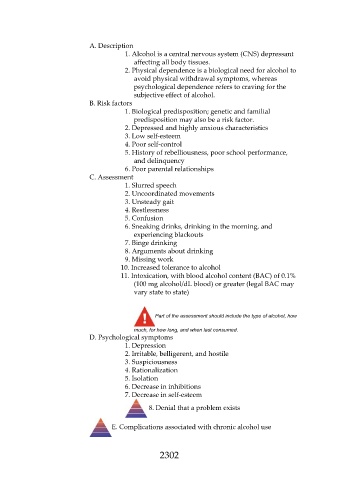Page 2302 - Saunders Comprehensive Review For NCLEX-RN
P. 2302
A. Description
1. Alcohol is a central nervous system (CNS) depressant
affecting all body tissues.
2. Physical dependence is a biological need for alcohol to
avoid physical withdrawal symptoms, whereas
psychological dependence refers to craving for the
subjective effect of alcohol.
B. Risk factors
1. Biological predisposition; genetic and familial
predisposition may also be a risk factor.
2. Depressed and highly anxious characteristics
3. Low self-esteem
4. Poor self-control
5. History of rebelliousness, poor school performance,
and delinquency
6. Poor parental relationships
C. Assessment
1. Slurred speech
2. Uncoordinated movements
3. Unsteady gait
4. Restlessness
5. Confusion
6. Sneaking drinks, drinking in the morning, and
experiencing blackouts
7. Binge drinking
8. Arguments about drinking
9. Missing work
10. Increased tolerance to alcohol
11. Intoxication, with blood alcohol content (BAC) of 0.1%
(100 mg alcohol/dL blood) or greater (legal BAC may
vary state to state)
Part of the assessment should include the type of alcohol, how
much, for how long, and when last consumed.
D. Psychological symptoms
1. Depression
2. Irritable, belligerent, and hostile
3. Suspiciousness
4. Rationalization
5. Isolation
6. Decrease in inhibitions
7. Decrease in self-esteem
8. Denial that a problem exists
E. Complications associated with chronic alcohol use
2302

